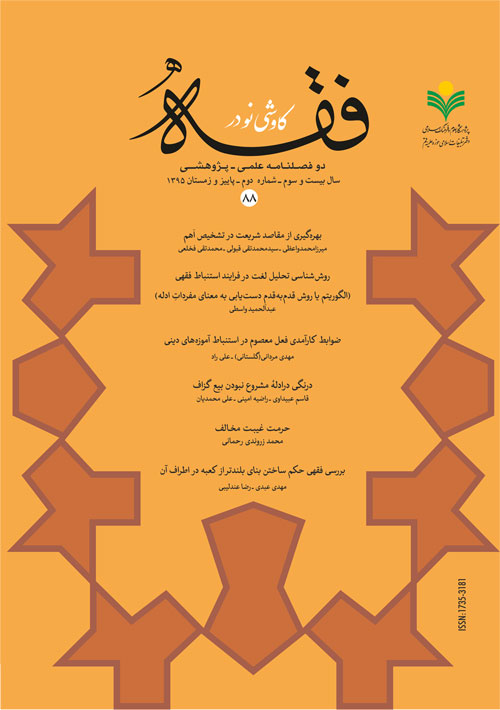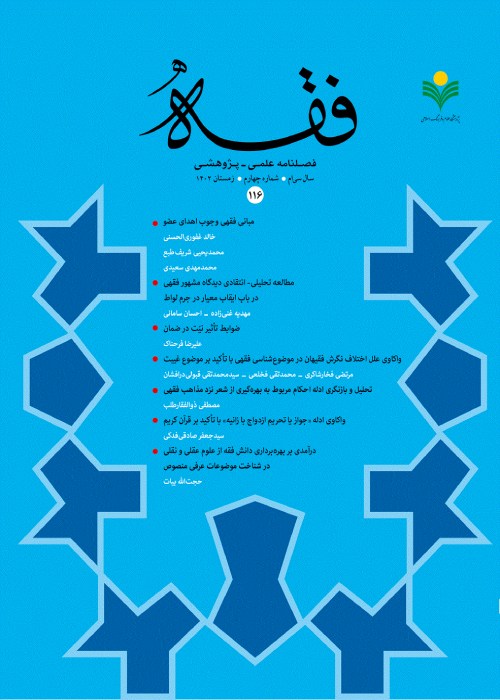فهرست مطالب

فصلنامه فقه
پیاپی 88 (تابستان 1395)
- تاریخ انتشار: 1396/03/09
- تعداد عناوین: 6
-
-
صفحات 7-30«مقاصد شریعت» از مباحث مبارک و نوظهوری است که تاکنون کارکردهای گوناگونی برای آن ذکر شده است. افزون بر نقش آن در تصحیح دیدگاه و زاویه اجتهادی، ظهورسازی و ظهورشکنی، درباره سندانگاری مقاصد نیز چندین رویه پدید آمده است؛ البته، بیشتر فقی هان با تردید به این موضوع نگریسته اند. در این نوشتار به مقاصد شریعت از دریچه ای دیگر و از زاویه مرجحیت باب تزاحم احکام نگریسته شده است. توضیح اینکه، پس از پیشینه مقاصد شریعت، در تبیین اهم این مقاصد و رابطه طولی شان کوشش شده، و وضعیت تزاحم میان پاره ای از احکام درپرتو به کارگیری مقاصد شرع به مثابه مرجح قطعی یا احتمالی بررسی شده است. از این بررسی ها نتایجی ملموس و کاربردی به دست آمده است.کلیدواژگان: مقاصد شریعت، سنجه اهم، مرجح باب تزاحم، ترتیب مرجحات
-
روش شناسی تحلیل لغت در فرایند استنباط فقهی(الگوریتم یا روش قدم به قدم دست یابی به معنای مفردات ادله)صفحات 31-62مسئله این بحث، دست یابی به روشی قدم به قدم برای کشف معنای لغاتی است که در ادله فقهی به کار رفته اند. در این بحث، با روش کتابخانه ای، پس از ارائه مبانی و پیش فرض های اصول فقهی، مانند بررسی حجیت قول لغوی، ابتدا آسیب های محتمل در تحلیل لغوی برشمرده شده ، سپس 13 گام اصلی دارای ترتیب، برای تحلیل روشمند و حجیت دار یک لغت عرضه گردیده است.
منابع لغوی لازم به ترتیب زمان معرفی شده اند، منابع پیرامونی مانند منابع مترادفات و متضادها، فروق اللغات، معانی مجازی، اصطلاحات، و روح معنایی نیز عرضه گردیده است و در هر قسمت، نمونه ای از عملکرد فقی هان در تحلیل لغت ارائه شده است.کلیدواژگان: اجتهاد، مراحل استنباط، لغت شناسی، الگوریتم تحلیل لغت -
صفحات 63-90فعل معصوم همچون گفتار ایشان یکی از اجزای سنت است و منبع مهمی برای استنباط آموزه های دینی به شمار می رود. بااین همه، این مولفه حدیثی، به دلیل ناشناخته ماندن ابعاد کارآمدی اش، آن چنان که باید، مورد توجه قرار نگرفته است. مقاله پیش رو کوشیده است با روش تحلیلی اکتشافی، ضوابط موثر بر استنباط از فعل معصوم را کشف و تبیین کند و درنتیجه، زمینه گسترش استنباط از فعل معصوم را فراهم آورد. دستاوردهای این پژوهش نشان می دهد ضوابط کارآمدی فعل معصوم در دو قسم ضوابط «احراز» فعل معصوم، و ضوابط «استنباط» از فعل معصوم مطرح شدنی اند. این ضوابط می تواند معیار اعتبارسنجی آموزه های برگرفته از فعل معصوم به شمار آید.کلیدواژگان: سنت فعلی، شرایط استنباط، استنباط از فعل معصوم، احراز فعل معصوم
-
صفحات 91-110مشهور فقی هان امامیه معامله تخمینی را سبب بطلان عقد بیع می دانند؛ حال آنکه امروزه در بسیاری از موارد، امکان آگاهی دقیق از مورد معامله فراهم نیست. نوشتار پیش رو با روشی توصیفی تحلیلی و به شیوه کتابخانه ای،میزان اعتبار چنین ادعایی را نقد و بررسی کرده است. نتایج تحقیق نشان می دهد روایاتی که فقی هان برای بطلان بیع گزاف به آنها استناد کرده اند، بر مدعای ایشان دلالت نداشته و اخص از مدعا هستند؛ افزون براین، به نظر می رسد ابزارهای اندازه گیری وزن کالا در فرض مسئله موضوعیت ندارد؛ بلکه ملاک مشخص شدن مورد معامله به نحوی است که سبب اختلاف نشود و این مهم ازطریق مشاهده و اعتماد عرفی نیز می تواند احراز شود.کلیدواژگان: بیع گزاف، تعیین مبیع، مکیل و موزون، تخمین و حدس، مشاهده عرفی
-
صفحات 111-134یکی از دغدغه های اساسی بشر امروز مقولات اخلاقی (اعم از اخلاق فردی و اجتماعی) است. بسیاری از مشکلات، اختلافات و نابسامانی های جوامع بشری ناشی از فقدان آن است.
یکی از این مقولات اخلاقی «غیبت» است که مباحث فراوانی را دربر دارد. صاحب نظران درباره قلمرو غیبت حرام اختلاف دارند. مشهور فقی هان امامیه بر این باورند که غیبت غیرشیعه اثناعشری جایز است. این نوشتار، نخست، ادله هفت گانه شیعه قائل به جواز را بررسی و نقد کرده است؛ سپس، ادله ای را اقامه کرده است بر حرمت غیبت مطلق مسلمان، اعم از فرقه های مختلف شیعه و مسلمانان اهل سنت، به جز ناصبی و غالی.کلیدواژگان: غیبت، مومن، مخالف، ناصبی، غالی، حرمت، جواز -
صفحات 135-158کعبه مکرمه نماد اسلام است، اسلامی که «یعلو و لا یعلی علیه» است. این برتری اسلام در شکوه و اعتلای کعبه جلوه گری می کند. باوجوداین، امروزه ساخته شدن بناهای مرتفع و مشرف به کعبه از شکوه آن می کاهد. گروهی از فقی هان شیعه به کراهت و گروهی به حرمت ساخت چنین بناهایی فتوا داده اند. باوجود روایات پرشمار بازدارنده از ساخت بنای بلندتر از کعبه در کتب اهل سنت، که بعضی از آن روایات بنابر مسلک خود ایشان صحیح است، ظاهرا کسی از فقی هان اهل سنت به این مسئله نپرداخته است. بررسی ادله عام و مطلق جاری در مسئله و روایات خاص بازدارنده از ساختن بنای مشرف به کعبه، جایی برای تردید در کراهت ساخت چنین بناهایی باقی نمی گذارد. هرچند حکم اولی ساخت چنین بناهایی کراهت است ولی لزوم رعایت مکروهات و مستحبات در حرم امن الهی درباره خود کعبه، که اعظم شعائر الهی است، با تاکید بیشتری نیز همراه خواهد بود. حکومتی که مدعی اسلامی بودن است، مسئولیت سنگین تری دربرابر این حکم دارد.کلیدواژگان: کعبه، بنای مرتفع، تعظیم شعائر، کراهت
-
Pages 7-30The Shari`ah`s purposes are one of the blessed and newfangled discussions that the various functions are stated for them. In addition to the effect of these aims on correcting the Ijtehadi (legal reasoning) approach and aspect, making appearance and disappearance of it, whether the these aims and purposes of the shari`ah are to be regarded as the legal evidence or not, several practices have been created. Of course, most of the jurisprudents have doubtfully looked at this issue.
This paper has considered the Shari`ah`s purposes according to an another trapdoor, and from an angle of predominance in the conflicted ordinances section. After explaining the background of the Shari`ah`s purposes, this article tries to specify the more significant aims and their linear relationship, and similarly to consider the situation of conflictions among some of Islamic ordinances in accordance with the light of utilizing Islamic legal aims as a definite or probable predominant. Some tangible and functional results are acquired by this study too.Keywords: the Shariah's purposes, determining the more important issue, predominant of confliction section, arrangement of predominant issues -
Pages 31-62The subject matter of this study is to obtain a method of step-by-step for finding out words` meanings used in the jurisprudential evidence. In this research, according to the library method, after presenting foundations and presuppositions of the jurisprudential principles such as considering the validity of a terminologist`s saying about the meaning of a word, the probable harms of a literal analysis are firstly enumerated and then, 13 steps for a methodical and valid analysis of the meaning of a word are respectively represented.
The required lexical sources have been orderly introduced; the surrounding sources such as the sources of synonyms and opposites, differences of words, metaphorical meanings, terms, and soul of meaning are also shown, and in each section, an example of the jurisprudents` practice for analyzing a word is represented.Keywords: Ijtehad (Islamic legal reasoning)_stages of inference_terminology_algorithm of analyzing a word -
Pages 63-90The Innocent`s behavior like his saying is one of the parts of the tradition and also is an important source for inferring the religious teachings. However, since the functional aspects of it are unknown, this narrative component has not been taken into consideration.
In an explorative - analytical method, the present paper has tried to find out and specify the effective criteria on the inference of the innocent`s act, and consequently, to prepare the ground of extending the inference to the Imam`s act. The achievements of this research show that the Functional standards of the Innocent`s behavior can be divided into two kinds: the explorative standards of the Infallible Imam`s behavior, and the deductive standards of the Infallible Imam`s behavior. These criteria can be regarded as the standards of validating the teachings derived from Imam`s act.Keywords: tradition of act, conditions of inference, inference from the Innocent's behavior, exploring the Innocent's behavior -
Pages 91-110The famous Imami Jurisprudents believe that a conjectural transaction makes a sale contract null and void while nowadays in a lots of cases , there is no possibility of accurate information about the subject-matter of the contracts. In a descriptive- analytical method and library way, this paper has considered and analyzed the amount of validity of such a claim. The results of this research show that the traditionswhich are referred by the Jurisprudents to nullity of Gazaf sale do not indicate their claim and they are more special than the mentioned claim. Moreover, it seems that in the supposition of question, the instruments of weighing a goods are not important, but the criterion is to be specified the subject matter of a contract in a way that does not cause any difference, and this significant issue can be determined by observation and customary confidence methods.Keywords: gazaf sale, specifying object of sale, measured, weighted, conjecture, guess, customary observation
-
Pages 111-134One of the human being`s contemporary main concerns is moral issues (both individual and social ethics); Many of the difficulties, disagreements and dislocations of human societies are arising from the lack of them.
One of the ethical issues is backbiting that contains lots of discussions. The pundits disagrees on the scope of prohibited backbiting. The famous Imami jurisprudents believe that backbiting a non - Imami shiite is permissible. This essay has firstly considered and criticized the seven evidence of the Shiites who are adherents of permission. It has secondly introduced the reasons of prohibition of backbiting the absolute Muslims both the different shia and suni sects except the Nasebis (the enemies of the prophet`s household) and the Ghalis (the exaggerators).Keywords: backbiting, believer, opponent, Nasebi, Ghali, prohibition, permission -
Pages 135-158Holy Ka`ba is the symbol of Islam; "Islam overcomes and is not overcome by any thing". This supremacy of Islam appears in the glory and magnificence of Kaba. Nevertheless, nowadays the high-rise buildings which are overlooking Kabah reduce its glory. According to a group of Shiite jurisprudents` opinion (fatwa), ordinance of constructing such buildings is reprehensible, while another group of them give an opinion that the Islamic rule is forbidden. In spite of many preventive traditions concerning construction of the taller buildings than Ka`ba in Sunni works, which some of these traditions are correct according to the very Sunni`s school, the Sunni jurisprudents apparently do not engage to state this issue at all. Reviewing the general and absolute evidence about the mentioned question and the preventive traditions with regard to making an overlooking building around Ka`ba leave no room for doubt that constructing such the buildings is reprehensible precept. However, the first ordinance about such buildings is reprehensible, but the necessity of complying with the reprehensible and recommended duties in the divine secure shrine concerning very Ka`ba which is the greater of the divine rites, will accompany by the more emphasis. The government claiming to be Islamic is under a heavier responsibility for this precept.Keywords: Kaba_high - rise building_respecting the rites_reprehensibility


